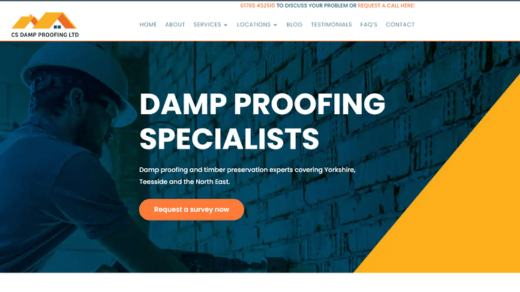Essential Damp Proofing: Protect Your Property from Moisture Damage

Damp proofing is a critical aspect of maintaining a property’s structural integrity and protecting it from moisture-related damage. It involves various techniques and solutions aimed at preventing moisture penetration into buildings, which can lead to issues such as damp walls, mold growth, and deterioration of building materials. Understanding damp proofing and consulting with damp proofing experts can help property owners address and prevent damp issues effectively.
Understanding Damp Proofing:
Damp proofing refers to measures taken to prevent moisture from entering a building through walls, floors, or foundations. It is essential in both new construction and existing buildings to mitigate the risks associated with dampness and moisture infiltration. Common causes of dampness include:
- Rising Damp: Moisture from the ground travels upwards through porous building materials like bricks or mortar, leading to damp patches on walls.
- Penetrating Damp: Water penetrates through external walls due to defects such as cracks, gaps, or damaged waterproofing membranes.
- Condensation: Excess moisture in the air within a building can lead to condensation on cold surfaces, causing dampness and mold growth.
Damp Proofing Techniques:
Effective damp proofing involves employing various techniques tailored to specific damp issues and building conditions:
- Damp Proof Courses (DPC): A DPC is a physical barrier installed horizontally within walls to prevent rising damp. It can be made of materials like bitumen, plastic, or slate and is typically installed during construction or retrofitted as part of damp proofing measures.
- Waterproof Membranes: Applied externally or internally to walls or floors, waterproof membranes create a barrier against water ingress and can be combined with drainage systems to redirect water away from foundations.
- Cavity Wall Insulation: Insulating cavity walls not only improves energy efficiency but also helps prevent cold spots where condensation and dampness can occur.
- Surface Treatments: Chemical damp proofing treatments involve applying water-repellent chemicals or coatings to walls to inhibit moisture penetration.
- Improving Ventilation: Adequate ventilation is crucial to control humidity levels indoors and prevent condensation. Ventilation solutions may include air bricks, extractor fans, or mechanical ventilation systems.
Benefits of Consulting Damp Proofing Experts:
- Expert Assessment: Damp proofing experts conduct thorough inspections to assess the extent and causes of damp issues in a property. They use specialized equipment and knowledge to diagnose the problem accurately.
- Tailored Solutions: Based on their assessment, damp proofing experts recommend customized solutions to address specific damp issues effectively. This ensures that damp proofing measures are appropriate and targeted to the property’s unique requirements.
- Quality Workmanship: Experienced damp proofing professionals have the skills and expertise to implement damp proofing techniques correctly and efficiently. They adhere to industry standards and regulations to deliver durable and effective solutions.
- Long-Term Savings: Investing in professional damp proofing can prevent costly damage repairs caused by dampness, such as structural deterioration and mold remediation. It also enhances property value and appeal by maintaining a dry and healthy indoor environment.
- Guarantees and Warranties: Reputable damp proofing companies often provide guarantees or warranties on their workmanship and materials used. This gives property owners peace of mind that damp proofing measures are reliable and backed by industry standards.
Choosing Damp Proofing Experts:
When selecting damp proofing experts, consider the following factors:
- Credentials: Ensure the company is qualified and accredited, such as being members of recognized trade associations or holding certifications in damp proofing techniques.
- Experience: Look for professionals with a proven track record in damp proofing and positive customer testimonials.
- Transparent Pricing: Obtain detailed quotes that outline the scope of work, materials used, and any guarantees offered.
- Communication: Choose experts who communicate clearly and provide explanations about damp issues, proposed solutions, and expected outcomes.
Conclusion:
Damp proofing is essential for maintaining a property’s structural integrity and protecting it from moisture-related damage. Consulting with damp proofing experts ensures that effective solutions are implemented to address and prevent damp issues, enhancing property durability, and indoor comfort. By investing in professional damp proofing, property owners can mitigate risks associated with dampness and maintain a dry, healthy living environment for years to come.



